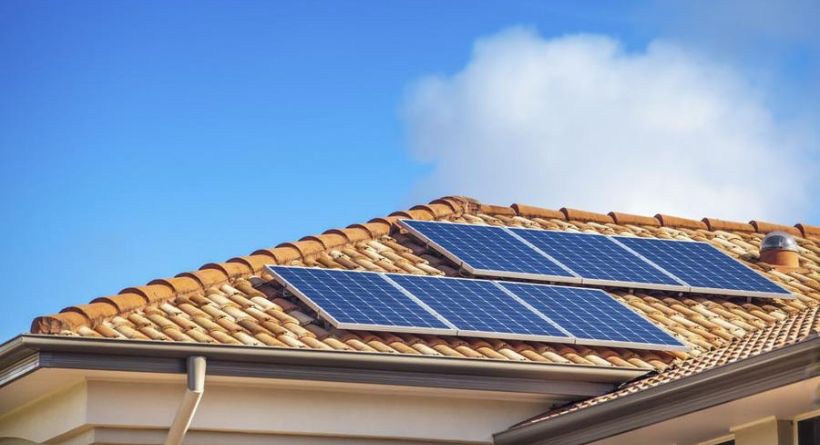Solar energy has become an increasingly popular option for homeowners looking to reduce their energy bills and lessen their environmental impact.
However, one of the biggest concerns is the cost of installing solar panels. The price of solar panels can range from $8,500 to $30,500, with the average cost of a 6kW system hovering around $12,700 before incentives and tax credits are applied.
This guide aims to provide a detailed breakdown of solar panel costs, including factors that influence pricing, types of solar panels, and how you can maximize your savings.
In addition to explaining the costs, we’ll also touch on important topics like installation, maintenance, and financing options to help you make a well-informed decision.
Average Cost of Solar Panels
Solar panel costs vary based on the type of panel, system size, and location. Below is a general table summarizing the average cost ranges for a 6kW system:
| Cost Breakdown | Cost |
|---|---|
| Average Cost | $18,604 |
| Highest Cost | $30,666 |
| Lowest Cost | $8,500 |
Cost of Solar Panels by State
Solar panel installation costs differ across states due to variations in electricity rates, sunlight availability, and local incentives.
Below is a state-by-state comparison of the average cost for a 6-kW system after the 30% federal tax credit:
| State | Average Cost (After 30% Tax Credit) | Electricity Rate (¢/kWh) | Household kWh Usage (Monthly) | Estimated Yearly Savings |
|---|---|---|---|---|
| Alabama | $10,542 | 14.98 | 1,178 | $2,123 |
| Alaska | $10,941 | 22.88 | 580 | $1,669 |
| Arizona | $10,654 | 14.46 | 1,061 | $1,849 |
| California | $11,666 | 31.23 | 535 | $1,715 |
| Connecticut | $12,558 | 29.52 | 716 | $2,487 |
This table highlights that savings vary widely by state due to local electricity prices and energy consumption.
ALSO READ: How Much Does LASIK Cost?
Types of Solar Panels and Their Costs
Solar panels come in three main types, each with its own efficiency levels and price points.
Understanding the differences can help you choose the right option for your needs and budget.
Monocrystalline Solar Panels
- Cost: $1 to $1.50 per watt.
- Description: These panels are made from single silicon crystals, making them highly efficient. They have a sleek black appearance and are more efficient in energy conversion but tend to be the most expensive option.
Polycrystalline Solar Panels
- Cost: $0.90 to $1.50 per watt.
- Description: Polycrystalline panels are made from multiple silicon fragments melted together. They are cheaper but slightly less efficient than monocrystalline panels.
Thin-Film Solar Panels
- Cost: $0.50 to $1.50 per watt.
- Description: Thin-film panels are the least expensive option, utilizing photovoltaic materials like amorphous silicon. They are flexible and lightweight but generally less efficient and require more space for installation.
Here’s a table comparing the cost by panel type:
| Panel Type | Cost Per Watt | 6kW System Cost (Materials Only) |
|---|---|---|
| Monocrystalline | $1.00 – $1.50 | $6,000 – $9,000 |
| Polycrystalline | $0.90 – $1.50 | $5,400 – $6,000 |
| Thin-film | $0.50 – $1.50 | $3,000 – $9,000 |
Cost of Solar Panel Systems by Size
The size of your solar panel system will determine how much electricity it can generate and, by extension, its cost.
Larger systems generally cost more, but they may be more cost-effective in the long run due to higher energy production.
| System Size | Average Annual Output (kWh) | Cost Before Tax Credit | Cost After Tax Credit (30%) |
|---|---|---|---|
| 5kW | 4,000 – 5,000 | $12,150 – $18,100 | $8,500 – $12,700 |
| 6kW | 8,000 – 10,000 | $14,600 – $21,700 | $10,200 – $15,200 |
| 8kW | 10,500 – 13,300 | $19,400 – $29,000 | $13,600 – $20,300 |
| 10kW | 13,300 – 16,700 | $24,300 – $36,200 | $17,000 – $25,300 |
| 12kW | 16,000 – 20,000 | $29,200 – $43,500 | $20,400 – $30,500 |
Factors That Influence Solar Panel Costs
Here are the factors that influence solar panel costs:
Price per Watt
Solar panel installation costs range between $2.40 and $3.60 per watt, which includes labor.
The more watts your system requires, the higher the overall cost. For example, a 6kW system would typically cost between $14,400 and $21,600 before incentives.
Amount of Sunlight
The amount of sunlight your location receives is a critical factor in the effectiveness of your solar panels. More sunlight generally means higher energy output and quicker ROI.
Local Incentives
Local incentives can significantly reduce the cost of your solar panel installation. These incentives vary by state and can include grants, rebates, and tax credits.
Mount Type
There are different types of mounts that can affect installation costs. Here’s a breakdown of the cost for different mounting systems:
| Mount Type | Cost per Panel |
|---|---|
| Fixed Mount | $15 – $50 |
| Ground Mount | $70 – $200 |
| Adjustable Mount | $30 – $250 |
| Dual-Axis Tracker | $450 – $775 |
Additional Solar Panel Costs
Beyond the upfront cost of installation, homeowners should consider long-term maintenance and potential repair costs.
Maintenance Costs
Regular maintenance is essential for optimal solar panel performance. Expect to spend between $140 and $180 annually on professional maintenance services.
Cleaning Costs
Annual cleaning is recommended to maintain efficiency. This service typically costs around $150 per cleaning, although DIY methods can bring the price down to around $100 for equipment.
Solar Panel Repairs
If any issues arise, such as cracked panels or inverter problems, repairs can range from $200 to $1,700, depending on the severity of the damage.
Financing Solar Panels
Given the high upfront costs, many homeowners explore financing options for their solar panel installation. Here are some popular financing methods:
| Financing Option | Description |
|---|---|
| Cash Payment | Paying in full ensures that you own the system and can immediately take advantage of tax incentives. |
| Solar Loans | Solar loans allow you to finance the system with monthly payments over time, usually with interest. |
| Solar Lease/PPA | A third-party owns the panels, and you pay monthly fees for the energy they produce. |
| Cash-Out Refinance | Refinancing your mortgage to free up funds for solar panel installation. |
| Home Equity Loan | Borrowing against your home equity to finance solar installation. |
How Much Do Solar Panels Save?
While the initial cost of solar panels can be high, the savings on your energy bill make it worthwhile.
The typical American family spends about $1,623 annually on electricity, and solar panels can reduce this significantly.
You can use online calculators to estimate your savings based on your location, energy usage, and system size.
Breaking Even on Solar Panel Investment
The break-even period for a solar panel system generally ranges between 6.4 to 9.5 years.
The time it takes to recoup your investment depends on factors like your local electricity rates, the size of your solar system, and available incentives.
Find Solar Installation Costs Within Your State
The cost of installing solar panels depends heavily on where you live. Different states have varying energy rates, sunlight exposure, and local incentives that influence how much you will pay.
Make sure to research local solar companies and explore state-specific incentives to get a clearer picture of installation costs in your area.
Are Solar Panels Worth It?
Solar panels are a great way to generate significant long-term savings on your electricity bill while reducing your carbon footprint.
Whether solar panels are worth it for you depends on several factors, primarily the cost of electricity in your area.
If you live in a state with high utility rates, such as California or Connecticut, solar panels can pay for themselves relatively quickly and save you thousands of dollars over the lifespan of the system.
According to a recent Forbes Home survey, over 50% of homeowners who installed solar panels experienced energy independence, while 30% reported an increase in their property’s value.
Additionally, 42.2% noted environmental benefits, making solar panels a good investment for the planet and your pocketbook.
ALSO READ: How Much Do Movers Cost?
DIY Solar Panel Installation: Is It a Good Idea?
While you may be tempted to install solar panels yourself to cut costs, it is not recommended unless you have experience with electrical work and construction.
A DIY solar panel installation kit costs about $1 to $2 per watt, but improper installation can lead to safety risks like electric shock, void your warranty, and potentially violate local laws requiring a licensed contractor to perform the installation.
Conclusion
Investing in solar panels may seem costly at first, but between tax credits, state incentives, and long-term savings on your electricity bills, it’s an investment that pays off.
With proper planning and professional installation, you can enjoy the benefits of solar energy for decades, from reduced bills to increased home value and a lighter environmental footprint.
Frequently Asked Questions (FAQs)
Q: How much energy can you save with solar panels?
A: Solar panels can save you a significant amount of energy, especially if your system is large enough to cover most or all of your home’s electricity needs. Even if your system switches between solar energy and grid energy, you’ll see a marked reduction in your electricity bills.
Q: Do solar panels increase the value of your home?
A: Yes. Homes with solar energy systems may sell for 4.1% more than homes without solar panels. They reduce electricity costs, making them attractive to prospective buyers.
Q: How long does solar panel installation take?
A: The typical solar panel installation takes between 1 to 5 days, depending on the size of the system, weather conditions, and roof accessibility.
Q: What is net metering?
A: Net metering allows you to send excess energy produced by your solar panels back to the grid. Your utility company compensates you by deducting the cost of this energy from your electricity bill, effectively paying you for the power your system generates.
Q: How long do solar panels last?
A: Solar panels typically last between 25 and 30 years, with some types lasting up to 40 years. Manufacturers usually offer warranties for 25 years to ensure peace of mind.
Q: How much does a 6kW solar system cost?
A: A 6kW solar system typically costs between $14,600 and $21,700, with the final price after tax credits landing between $10,200 and $15,200.
Q: How much does a 10kW solar system cost?
A: A 10kW solar system can cost anywhere from $24,300 to $36,200. After applying the 30% tax credit, the price range drops to $17,000 to $25,300.







